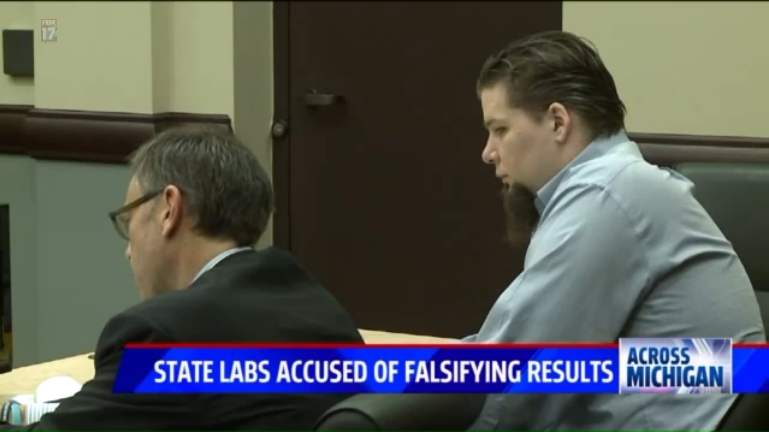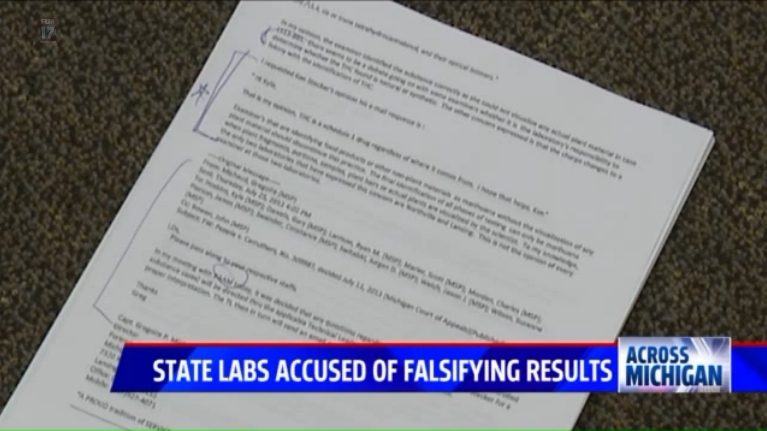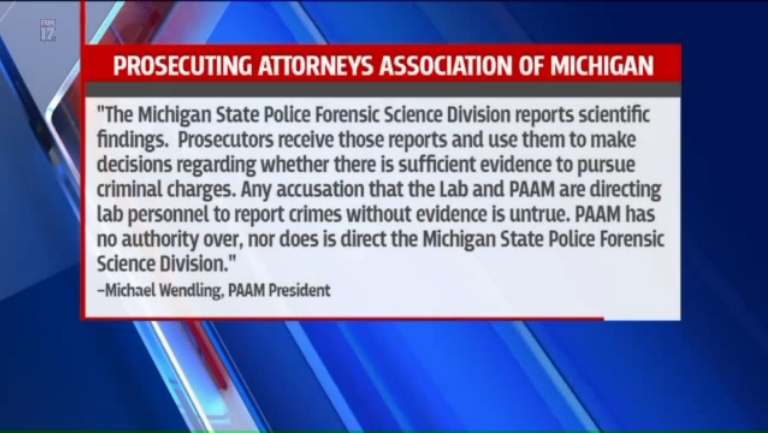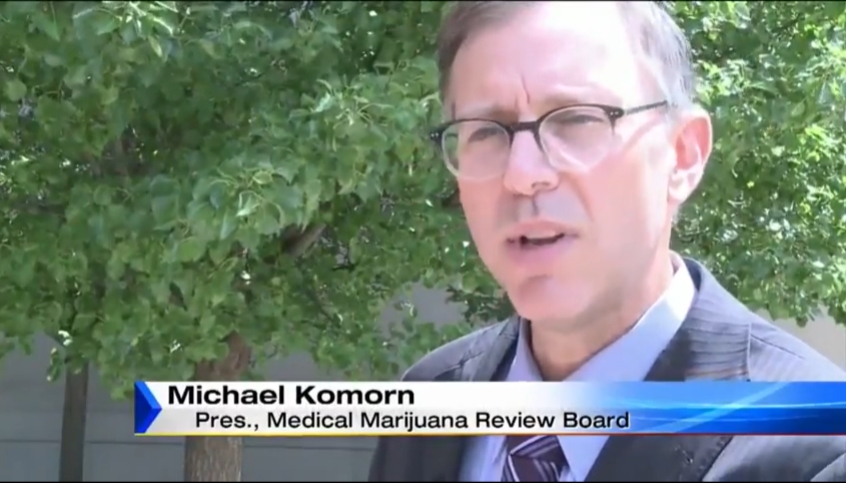
Nov 4, 2015 | Blog, Criminal Defense Attorney Michael Komorn, Medical Marijuana Attorney Michael Komorn, News
OTTAWA COUNTY, Mich. – The evidentiary hearing originally set for Nov. 5 has been dropped in the case involving a medical marijuana patient charged with a disputed felony for synthetic THC, the psychoactive ingredient in marijuana.
The Ottawa County Assistant Prosecutor filed motions to quash, or suppress, the defense’s subpoenas, and adjourned the Nov. 5 hearing until a later date. Essentially this move buys the prosecution more time before explaining this issue of possible politicking in Michigan State Police Forensic Science crime labs’ marijuana reporting.
Since February, FOX 17 has covered this case involving the defendant, Max Lorincz, a Spring Lake father charged with a felony for having medical marijuana. His attorneys with Komorn Law PLLC argue Lorincz’s “smear” amount of butane hash oil is covered under the Michigan Medical Marijuana Act as “usable marijuana,” or specifically the “mixture of preparation” of the marijuana plant.
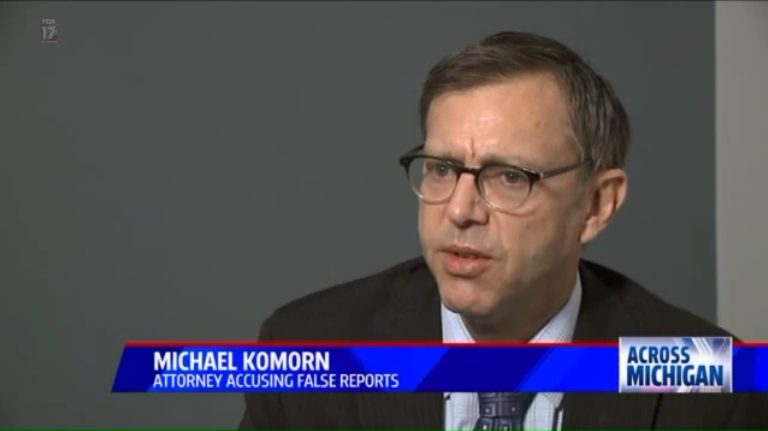
Since last week FOX 17 is leading statewide coverage of a major development in the case: the defense’s claim that state police crime labs are misreporting marijuana test results. This results in ambiguous crime lab reports leading to felonies charged, despite no credible proof beyond a reasonable doubt of what the substance actually is.
The prosecution filed a motion to quash the defense subpoenas in rebuttal to the defense’s motion to quash Lorincz’s bindover and well as their motion to show cause to produce evidence and testify against incriminating emails that spell out a debate among law enforcement, scientists, and prosecutors associated with the Attorney General’s office in reporting marijuana forensically.
Earlier, the defense’s motion to show cause subpoenaed 13 people to appear in court this Thursday: 11 MSP crime lab employees, one West Michigan Enforcement Team member, and the one prosecutor with the AG’s office. The defense had ordered the named people to show lab reports, communications, and marijuana related forfeitures, all of which would produce important testimony.
However, Assistant Prosecutor Karen Miedema in her motion to quash subpoenas argued whether these people should even testify, and wrote that this would take too much time: citing Lorincz’s preliminary exam last spring, which took three hours to hear two witnesses.
Although Miedema filed this motion Oct. 30, the defense told FOX 17 they just received a phone call Tuesday adjourning Thursday’s evidentiary hearing. The defense plans to file further motions and call for a hearing likely in December.
FOX 17 reached out to the Ottawa County Prosecutor’s office and has not heard back.
Tune into FOX 17 News at 10 p.m. Thursday for an in-depth story into the developing allegations in this case.
Dana Chicklas
fox17online.com /2015/11/03/hearing-in-alleged-false-crime-lab-marijuana-reporting-dropped-thisweek/

Nov 1, 2015 | Blog, Medical Marijuana Attorney Michael Komorn, Michigan Medical Marijuana Act, News, Recent Victories
OTTAWA COUNTY, Mich. – First uncovered by FOX 17 an alleged scandal in how state crime labs are testing and reporting marijuana, namely marijuana by-products with no visible plant matter, as felonies.
We first brought you the case of an Ottawa County father, Max Lorincz, who was slapped with a felony after he refused to plead guilty to a misdemeanor marijuana possession charge, as he is a medical marijuana card-carrying patient. Now he faces the felony charge of synthetic Tetrahydrocannibinol (THC) possession.

Lorincz lost custody of his 6-year-old son in part due to this felony.
After reporting on the case over nine months, FOX 17 exclusively reported a shocking email chain that spans months between Michigan State Police Forensic Science Division employees and the Attorney General’s office.
Obtained through the Freedom of Information Act, these emails show debates on how the state’s crime labs changed how they report marijuana. The defense, attorney Michael Komorn and Komorn Law, PLLC, is charging state agencies with directing the lab employees to falsely present results on marijuana products, including cases where plant material is not seen.
The result: felony charges Komorn argues are lies.

Komorn showed evidence in emails that MSP Forensic Science Division is being directed by the Attorney General’s office and the Prosecuting Attorneys Association of Michigan (PAAM) to change the way marijuana is reported to create felonies. PAAM is a non-profit, which is governed by a board of directors including the Attorney General.
“What is unique about this case is that they [the prosecution] are relying on the lab to report these substances so that they can escalate these crimes from misdemeanors to felonies,” said Komorn.
Documents obtained via FOIA, showcase emails about meetings (for instance, July 2013) and direct communication between MSP Forensic Science Division directors, scientists, PAAM, as well as officials with the AG’s office.
An excerpt from an email dated Dec. 13, 2013 suggests an AG official influenced the state crime labs on whether it is the lab’s responsibility to determine if THC tested is natural or synthetic; again, this is the difference between a misdemeanor and a felony.
A technical leader of controlled substances with MSP crime labs wrote an email to colleagues and quoted Ken Stecker, an official with the AG’s office:

“That is my opinion, THC is a schedule 1 drug regardless of where it comes from. I hope that helps. Ken”
Then, the technical leader of controlled substances at a state lab continues to direct other state lab personnel and write:
“Examiner’s that are identifying food products or other non-plant materials as marihuana without the visualization of any plant material should discontinue this practice. The final identification of all phases of testing can only be marihuana when plant fragments, portions, samples, plant hairs or actual plants are visualized by the scientist. To my knowledge, the only other two laboratories that have expressed this concern are Northville and Lansing.”
Komorn believes this policy change is not science-based.
“This is like a political decision, and somewhere in there they say well Ken Stecker is going to be the consultant on this going forward, and his position is that THC is a schedule 1,” said Komorn.
“That’s not the law. That’s an incorrect, illegal misinterpretation of the law that he then decrees as the policy for the state lab.”
This AG official’s “opinion” was written into lab procedure. Several emails show other MSP lab supervisors and scientists vehemently oppose it.
For example, a MSP Lansing controlled substances supervisor wrote his disagreements with this policy to colleagues, including an excerpt from an email dated Feb. 14, 2014:
“Prosecutor’s rely on our reports to determine what to charge a person with. A report that states delta-1-THC without any other statement would lead a Prosecutor to the synthetic portion of the law since this is the only place where THC is specifically listed. This could lead to the wrong charge of possession of synthetic THC and the ultimate wrongful conviction of an individual. For the laboratory to contribute to this possible miscarriage of justice would be a huge black eye for the Division and the Department.”
This supervisor wrote further concerns in an email to many colleagues nearly one year later, dated Jan. 28, 2015, writing in part:
“Upon reading this correspondence I immediately thought about the Guiding Principles training we receive yearly. Under Professionalism it states that “Conclusions are based on the evidence and reference material relevant to the evidence, not on extraneous information, political pressure, or other outside influences.” Whether or not an individual has a medical marijuana card is immaterial to how we report out our results.
When we made the previous changes I made it very apparent that I did not agree with it. One of my concerns was that by reporting out THC instead of marihuana it would lead to Prosecutors charging people with synthetic THC. This appears to be what the agency wants.”
Another MSP Northville lab scientist wrote the following to colleagues, stating concerns with new reporting policy:
“In order to place the actual compound THC in schedule 1, the criteria of ‘synthetic equivalent’ should be met. Since we really can’t do this, there are many of us who feel that these new evidentiary materials containing THC without any botanical morphology characteristics (candy, butter, etc..) should be identified as resinous extracts of Marihuana.
If you are to call it ‘THC,’ at a minimum, a statement should be provided in the additional information stating that the ‘origin, whether naturally occurring or synthetic could not be determined.’ Also, by going out on that limb and calling it THC, you now jump from a misdemeanor to a felony charge.
We’re bringing this up because there seemed to be some concern about uniformity in making these calls. Further, it is highly doubtful that any of these Med. Mar. products we are seeing have THC that was synthesized. This would be completely impractical. We are more likely seeing naturally occurring THC extracted from the plant!”
“The most damning evidence is that their own forensic scientists, when they’re objecting to the way the lab is going to change their reporting policies, calls them out that they can’t do it based on forensic science, and yet they do it anyways,” said Komorn.
Thursday afternoon, the Prosecuting Attorneys Association of Michigan’s President Michael Wendling responded to FOX 17’s questions with the following statements:
“The Michigan State Police Forensic Science Division sets its own testing and reporting protocols. Neither PAAM nor county prosecutors make those protocols.”
“The MSP Forensic Science Division makes its own decisions relative to the lab protocol. Any decision to report that the source of THC is undetermined does not create a misdemeanor or felony offense. Lab reports document the findings of scientific testing. Those findings, in conjunction with other relevant evidence are considered by prosecutors may be used in when the decision whether to charge a crime and which crime to charge is made.”
“Prosecutors do not receive requests to charge criminal cases from the MSP Forensic Science Division. The MSP Forensic Division reports scientific findings. Prosecutors receive those reports and use them to make decisions regarding whether there is sufficient evidence to pursue criminal charges. Any accusation that the Lab and PAAM are directing lab personnel to report crimes without evidence is untrue. PAAM has no authority over, nor does it direct the MSP Forensic Science Division.”

Yet again in this case, several lab scientists and supervisors expressed they are against this new marijuana reporting protocol.
As FOX 17 reported, the defense filed several motions in Ottawa County Circuit Court this week. The motions ask for Max Lorincz’s charges to be dismissed, as well as asking the accused organizations’ employees to show cause, or credible evidence to show science backs their protocol, in order to not be held in contempt of court.
The evidentiary hearing is set for Nov. 5.
FOX 17 also reached out to the Attorney General’s office for comment, but has yet to hear back. Michigan State Police public affairs personnel released comment to FOX17 Wednesday.
Watch The Report

Oct 31, 2015 | Blog, Criminal Defense Attorney Michael Komorn, Komorn Law Blog, Medical Marijuana Attorney Michael Komorn, News
Posted on MLive 10/30/15
OTTAWA COUNTY, MI – An attorney claims prosecutors pressured state police crime labs to change the way THC, the active ingredient in marijuana, is reported in an effort to circumvent Michigan’s medical marijuana law.
Michael Komorn alleges scientists were told to report an unknown origin for THC contained in oil, wax or perhaps a brownie if no visible plant material was present. The THC would then be declared a synthetic substance rather than marijuana – turning a misdemeanor pot charge to a two-year felony.
“The crime lab is systematically biased towards falsely reporting Schedule 1 synthetic THC, a felony, instead of plant-based marijuana, a misdemeanor, ” Komorn, a Southfield attorney known for handling medical marijuana cases, told The Grand Rapids Press and MLive.
In the case of Max Lorincz, a 35-year-old Spring Lake man with a medical marijuana card, the change could turn him into a felon, Komorn said.
Lorincz’s troubles started in September 2014 after calling 911 for medical assistance for his wife. A police officer responded and spotted a small amount – “a smudge,” Komorn said – of hash oil.
Ottawa County prosecutors charged him in January with marijuana possession, a misdemeanor. He refused to plead guilty because he was a valid medical marijuana user. The charge was dropped in February, only to be replaced by the felony synthetic THC charge.
Komorn used the Freedom of Information Act to obtain numerous emails from state police crime lab workers, some raising concern about the way they had to report THC cases. Others testified in court about the new policy of denying evidence of THC coming from a marijuana plant if no material is found.
He contends that the Prosecuting Attorneys Association of Michigan and state Attorney General Bill Schuette, an opponent of medical marijuana, influenced state police policy.
“It is scandalous, scandalous. How can you trust the state lab when they are influenced by politicians?” he said.
State police said in a statement: “The ultimate decision on what to charge an individual with rests with the prosecutor. The role of the laboratory is to determine whether marihuana or THC are present. Michigan state police laboratory policy was changed to include the statement “origin unknown” when it is not possible to determine if THC originates from a plant (marihuana) or synthetic means. This change makes it clear that the source of the THC should not be assumed from the lab results.”
Ottawa County Prosecutor Ronald Frantz could not be reached for comment.
A hearing in Lorincz’s case is set for Nov. 9 in Ottawa County Circuit Court.
In an email Komorn obtained from authorities, a state police crime lab supervisor, Kyle Hoskins, said examiners need to see plant material because they would have no idea how it was produced unless they watched its production. He noted the debate and asked the opinion of Ken Stecker of the Prosecuting Attorney Association of Michigan, who reportedly responded: “That is my opinion, THC is a schedule 1 drug regardless of where it comes from. I hope that helps. Ken.”
Marijuana is a Schedule 2 drug under state law.
Related: ‘It’s been a nightmare,’ man says of contested synthetic marijuana charge
Lt. James Pierson, director of the Grand Rapids laboratory, said that police are finding a “significant amount of THC wax and oil,” which he said are not covered by the medical marijuana law.
If police seize wax or oil from a medical marijuana patient, and the lab test identifies the substance as marijuana, rather than delta-1-THC, there is no probable cause to arrest, Pierson said in an email referenced by Komorn in court filings.
He said he learned that if a “speck” of plant material is in the oil, the test will come back as marijuana.
“Is there any way to get this changed? Our prosecutors are willing to argue that one speck of marijuana does not turn the larger quantity of oil/wax into marijuana,” Pierson wrote.
Bradley Choate, supervisor of the Controlled Substances Unit in Lansing, disagreed with the changes. He said analysts are left with two choices when finding THC: identify it as marijuana, which is a misdemeanor for possession, or a synthetic equivalent of THC, which is a felony if possessed.
“There is not a third choice,” Choate wrote. “The question then becomes is the THC from a natural source, i.e., marihuana, or a synthetic source. The presence of other cannabinoids indicates that the substance is from a natural source. I don’t know of any other way to determine that THC was synthesized unless a lab was found and the pre cursor substances to make THC were present.”
He said prosecutors rely on their reports in filing charges. A report that says delta-1-THC with no explanation would lead a prosecutor to think the substance was synthetic.
“This could lead to the wrong charge of possession of synthetic THC and the ultimate wrongful conviction of an individual. For the laboratory to contribute to this possible miscarriage of justice would be a huge black eye for the Division and the Department.”
As forensic scientists, Choate said they had to apply science to the law.
“I have a problem with the procedure manual stating that a conclusion of marihuana cannot be stated in the report. … The conclusion is incorrect because the resins are Marihuana. Apparently analysts in our system (are) hung up on the fact that to identify marihuana they need to see plant material.”
Choate said that “Guiding Principles” training says “that ‘Conclusions are based on the evidence and the reference material relevant to the evidence, not on extraneous information, political pressure, or other outside influences.”
“When we made the previous changes I made it very apparent that I did not agree with it. One of my concerns was that by reporting out THC instead of marijuana it would lead Prosecutors charging people with synthetic THC. This appears to be what the agency wants. The question I would pose to all of our analysts is how they would answer questions on the stand.
“In the scenario described how would they answer the question that absent the plant material speck, in their opinion is the rest of the wax material marihuana or not and in their opinion is the THC identified synthetic or natural? Again the legal definition of marihuana includes the resinous extract which contains cannabinoids and we can identify those cannabinoids.”
see original article and more stories here
John Agar covers crime for MLive/Grand Rapids Press E-mail John Agar: jagar@mlive.com and follow him on Twitter at twitter.com/ReporterJAgar

Sep 15, 2015 | Blog, Komorn Law Blog, Medical Marijuana Attorney Michael Komorn, News
Medical pot offers hope for autistic children
Detroit News Opinion Page 12:09 a.m. EDT August 25, 2015
A letter by Michael Komorn was featured in the Detroit News regarding medical marijuana and children with autism.
In the United States, and in Michigan, autism is growing. In fact, it is growing at such an alarming rate that it has just recently been identified as a significant public health issue, due to statistics provided by the Center for Disease Control’s Autism and Developmental Disabilities Monitoring Network, a nationwide federal program that tracks autism rates around the country.
Estimates show that autism rates have risen in every report since tracking began in 2002, from 1 in 150 in 2002 to 1 in 68 in 2010. There is not a cure, however, new studies show, autism can be treated.
Some 800 pages of research along with 75 peer review articles on cannabis as a viable option for the treatment of autism were recently gathered by Dr. Christian Bogner, a prominent pediatrician currently in practice with one of Metro Detroit’s largest health systems, and presented to LARA, the Michigan Department of Licensing and Regulatory Affairs.
This data is part of a new, thoroughly researched petition to add autism to the list of conditions, which can be treated with medical marijuana. On July 31 in Lansing, the Michigan Medical Marijuana Review Panel voted yes to recommending medical cannabis as a legal, permissible treatment for all autistic patients. This would include pediatric and juvenile patients under the age of 18 with approval from two physicians. That recommendation is currently being considered by David Zimmer, director of LARA, a Gov. Rick Snyder appointee. The fate of thousands of autistic children now rests in his hands.
It has been a long and difficult road. Initially, and despite what can only be described as overwhelming evidence, LARA, tasked with addressing petitions for new conditions, initially refused to hold a hearing or even consider the petition. As a result, attorneys Tim Knowlton and myself, the Michigan Medical Marijuana Association, and Cannabis Patients United, sued LARA in Ingham County Court. It was only after nearly a year of litigation and foot dragging that LARA ceded its position. Attorney General Bill Schuette’s office “defended” LARA’s position by delaying for months, only yielding after the petitioner filed her brief with the court, days before oral arguments. Meanwhile, parents are treating their autistic children, typically orally in tandem with olive oil or other edible sources.
Today, we are at a crossroads. A pivotal moment in history.
All too often the issues regarding medical marijuana are politicized. What is at issue here is the right and desire of parents to protect and treat their children, without fear of breaking the law. What would each of us do for our children if similarly afflicted? In particular when there is medicine available that has already proven effective in treating epilepsy and autism? Our families should have choices. Michigan’s parents and their children should have hope.
Michael Komorn, president,
Michigan Medical Marijuana Association
http://www.detroitnews.com/story/opinion/2015/08/25/medical-pot-autistic-children/32279201/
PDF Link

Aug 30, 2015 | Blog, Criminal Defense Attorney Michael Komorn, Medical Marijuana Attorney Michael Komorn, Michigan Medical Marijuana Act, Michigan Medical Marijuana Criminal Defense Attorney Michael Komorn, News
“Allowing medical marijuana for those with autism was supposed to be the clinical trial,” Komorn said. “Instead, we’re going to have criminal trials.”
Lawyer slams decision to deny cannabis to autistic kids
The Detroit News Article
August 28, 2015 – Lansing — Michigan’s regulatory director on Thursday rejected the use of medical marijuana for the treatment of children with severe autism.
Michigan was poised to possibly become the first state to allow medical cannabis consumption for children with severe autism when the state’s Medical Marijuana Review Panel voted 4-2 earlier this month to recommend autism as a condition that qualifies for the drug.
Mike Zimmer, director of the Michigan Department of Licensing and Regulatory Affairs, said he rejected the request because of the lack of medical evidence showing marijuana helps with treating autism. He cited the opposition from the state’s chief medical examiner, Dr. Eden Wells.
“This lack of scientific evidence is more concerning when considering the broad scope of the petition, which does not limit medical marijuana treatment to overly severe cases of autism,” Zimmer said in his four-page letter.
Michael Komorn, a lawyer who filed the petition on behalf of a mother in southeast Michigan, called the decision disappointing and misguided. He said he’s considering seeking judicial review of the decision in Ingham County Circuit Court, where a judge’s prior ruling led to the review panel decision.
“He calls out the 55 parents and calls them all criminals. How dare you?” Komorn said of the impact of Zimmer’s decision on families seeking legalization of marijuana for autism treatment. “These parents are all in because their children are sick.”
Komorn said Zimmer’s concerns about a lack of controlled trials “is the red herring we’ve been fighting for a long time.”
Parents, he said, “are coming forward with anecdotal evidence” their children are being helped. The proper starting point for a clinical trial would be allowing them to continue, Komorn said.
Dr. David Crocker, a Kalamazoo physician who recommends cannabis use for patients with chronic pain, serves on the state’s medical marijuana board and questions its purpose if Zimmer can overrule Michigan’s marijuana “experts.”
“If you’re going to assemble a panel of experts for the purposes of determining this, why wouldn’t you go with their recommendation?” Crocker said. “I thought that our advice would be heeded in this case.”
But Lt. Gov. Brian Calley, who has a daughter with autism, supported the decision.
“While I fully support finding new treatment options, there are neither sufficient studies nor scientific trials demonstrating its clinical impact to justify approval at this time,” Calley said in a statement.
Paul Welday, head of a marijuana advocacy group seeking reforms of Michigan’s medical marijuana law, said Zimmer’s decision “has met with universal disdain by virtually everyone who has been watching this issue.”
Welday said his organization, the Michigan Responsibility Council, “will be talking with our attorneys/drafters to include both autism and Parkinson’s as eligible conditions” for medical marijuana in reforms it is proposing lawmakers adopt this fall. The organization wants to work with lawmakers on pending legislation that also would set up a regulatory regime governing medical marijuana policies.”
State law doesn’t appear to allow the use of marijuana oil or juice — two methods that advocates described as ways children could take medical marijuana, Zimmer said.
He also worried that allowing autistic children to use medical marijuana could cause an explosion of use with unknown health consequences, considering the prevalence of autism in Michigan.
The director added that autistic children who experience seizures because of their condition may already be eligible to use medical marijuana as a treatment under state law.
Supporters argued oil extracted from marijuana and swallowed has been effective in controlling extreme physical behavior by kids with severe autism.
But Michigan’s 2008 voter-initiated law did not explicitly legalize oil-based cannabis products. Supporters of marijuana for children with autism said the drug could be ingested orally instead.
“The reality is there are other ways of ingesting it besides the oil form that can be just as effective,” Crocker said. “I don’t think that the fact the oils are illegal should preclude autism from being a qualifying condition.”
The panel that initially approved the use of marijuana for autistic children was influenced by comments from some Detroit-area doctors, especially the head of pediatric neurology at Children’s Hospital of Michigan, and from parents desperate for relief.
The state panel in 2012 and 2014 rejected allowing medical marijuana for autism. It led to a court battle and a challenge by Attorney General Bill Schuette before the panel accepted the latest formal request in the spring.
Article by
Gary Heinlein and Chad Livengood, Detroit News Lansing Bureau August 28, 2015

Aug 16, 2015 | Blog, Health Benefits of Marijuana, Komorn Law Blog, Medical Marihuana Review Panel, Medical Marijuana, Medical Marijuana Attorney Michael Komorn, News
Michael Komorn, a Michigan attorney who specializes in medical marijuana laws and is also the president of the Michigan Medical Marijuana Association, who filed a petition on behalf of a mother with a child who has Autism in southeastern Michigan spawned a flurry of articles through out the media world.
Please watch the video from the meeting and Michael Komorn’s comments
https://www.youtube.com/watch?v=4wN8CRGjwAM&sns=em
Below are links to numerous media articles related to the issue of adding autism to the list of qualified ailments for Medical Marihuana in Michigan..
LARA omits Autism
State officials on Monday acknowledged they’d omitted hundreds of pages of medical studies from packets supplied to a state review panel slated to consider medical marijuana for treating autism according to the Detroit Free Press.
The panel will reconvene July 31 to reconsider autism, officials said.
Michigan Panel Recommends Allowing Marijuana For Children With Autism
CBS Local – Aug 1, 2015
LANSING (AP) – Michigan would become the first state to allow medical marijuana for children with severe autism if a senior official follows the recommendation made Friday by an advisory panel. The state’s Medical Marijuana Review Panel voted 4-2 to …
Michigan medical marijuana panel votes to add autism treatment to state law
MLive.com – Jul 31, 2015
LANSING, MI — The Michigan Medical Marijuana Law Review Panel voted Friday to recommend adding autism as a qualifying condition fit for treatment under the state law. That recommendation now heads to Mike Zimmer, director of the Michigan …
Michigan a step closer to allowing marijuana for autism
Detroit Free Press – Jul 31, 2015
LANSING – Michigan would become the first state to allow medical marijuana for children with severe autism if an official follows the recommendation of a state panel. The Michigan Medical Marijuana Review Panel voted, 4-2, Friday to recommend autism as …
State Panel To Vote On Medical Marijuana For Autism
CBS Local – Jul 31, 2015
LANSING (AP) – A state panel is meeting again to consider whether to add extreme forms of autism to the conditions that qualify for medical marijuana in Michigan. Supporters say oil extracted from marijuana has been effective in controlling severe …
State Board Says People With Autism Should Be Able to Use Medical Marijuana
WMUK – 16 hours ago
A state board has approved adding autism to the list of conditions that can be treated with medical marijuana. The Michigan Medical Marihuana Review Panel voted 4-2 on Friday to make the recommendation. The final decision will be made by Michigan …
Michigan Review Panel Includes Autism As Condition For Medical Marijuana …
TestCountry.com (blog) – 20 hours ago
The Michigan Medical Marijuana Review Panel has recommended to include autism as one of the health conditions that the state approves for medical marijuana treatment. The recommendation, which the panel released on July 31, is one step closer to …
Michigan Medical Marijuana Panel Approves Autism, A Step Closer To Cannabis …
The Inquisitr – Aug 2, 2015
Supporters of medical marijuana in Michigan received some surprising and hopeful news. On Friday, the Michigan Medical Marijuana Review Panel voted to recommend that autism be added to the list of conditions that doctors can prescribe medical …
Michigan panel recommends permitting marijuana for autism
Observer News – Aug 2, 2015
LANSING, Mich. (AP) — Michigan would develop into the primary state to permit medical marijuana for youngsters with extreme autism if a senior official follows the advice made Friday by an advisory panel. The state’s Medical Marijuana Evaluation Panel …
Michigan Medical Marijuana Review Panel Approves Autism
The Weed Blog (blog) – Aug 1, 2015
Fathers high-fived with their children. Old men shed tears. Strangers embraced as if friends. Autism was recommended to be included in the list of illnesses covered under the protections of the Michigan Medical Marihuana Act. Although there still …
State panel endorses medical pot for autism
The Detroit News – Jul 31, 2015
In this photo taken on June 26, Ida Chinonis helps her daughter, Bella, take her cannabis based medication at their home in Grand Blanc. Bella, 6, suffers from seizures, and her mother says the only medication that helps her is a cannabis oil. (Photo …
Michigan panel supports pediatric use of medical marijuana for autism
WLNS – Jul 31, 2015
(WLNS) – According to the Centers for Disease Control and Prevention one in every 68 American children have some form of autism. On Friday families directly affected by autism are one step closer toward being able to use marijuana as a form of treatment.
State panel votes on medical marijuana for autism
Daily Mining Gazette – Jul 31, 2015
LANSING, Mich. (AP) — A state panel has recommended that severe forms of autism be added as a condition that qualifies for medical marijuana in Michigan. The Michigan Medical Marijuana Review Panel voted 4-2 Friday to recommend its use. The group’s …
Review Panel Recommends Marijuana for Autism
WILX-TV – Jul 31, 2015
“We’ve been doing all of the regular gammits of everything that doctors recommend for us to do – advanced behavioral analysis therapy, occupational therapy, speech therapy. We have him maxed out,” explained Bruno’s Father, Dwight Zahringer.
State panel votes yes to medicinal marijuana for severe autism
MI News 26 – Jul 31, 2015
A state panel met on Friday to consider adding extreme forms of autism to the list of conditions that qualify for the use of medical marijuana in Michigan. In a 4-2 vote, the Michigan Medical Marijuana Review Panel is recommending the approval of a …
State Panel Recommends Allowing Medical Marijuana For Severe Autism
9&10 News – Jul 31, 2015
A state panel is recommending Michigan add extreme forms of autism to the conditions that qualify for medical marijuana. In a 4-2 decision, the Michigan Medical Marijuana Review Panel voted to recommend allowing medical marijuana for children with …
Review Board to Decide if Marijuana Can Treat Autism
WILX-TV – Jul 31, 2015
The state’s Department of Licensing and Regulatory Affairs Marijuana Review Panel is expected to vote today on whether or not medical marijuana can be used as treatment for people with autism. The panel has held a public hearing and reviewed several …
Can medical marijuana treat autism?
WDIV Detroit – Jul 31, 2015
A regulatory panel will consider is autism will be included on the list of things medical marijuana can legally treat. Show Transcript Hide Transcript. THEY JUST DID WHAT THEY HOPED EVERYONE WOULD DO IN THAT SITUATION. Karen: SOME SAY IT’S …
State Panel To Decide On Treating Autism With Marijuana
WILX-TV – Jul 31, 2015
Parents who are in favor of the proposal say medical marijuana in small doses works wonders with kids who have autism, and that it helps with behavioral issues. Opponents say there is no strong evidence the drug is very helpful. LANSING A state panel …
Big Vote On Autism And Medical Marijuana Tomorrow In Michigan
The Weed Blog (blog) – Jul 30, 2015
autism cannabis marijuana Multi-talented Michigan attorney Michael Komorn is calling on families of children with autism to attend a crucial vote of the Medical Marihuana Review Panel on July 31st. The Panel is considering whether to recommend approval …



